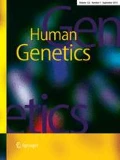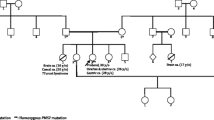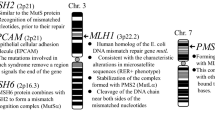Abstract
Heterozygous mutations in one of the mismatch repair (MMR) genes MLH1, MSH2, MSH6 and PMS2 cause the dominant adult cancer syndrome termed Lynch syndrome or hereditary non-polyposis colorectal cancer. During the past 10 years, some 35 reports have delineated the phenotype of patients with biallelic inheritance of mutations in one of these MMR genes. The patients suffer from a condition that is characterised by the development of childhood cancers, mainly haematological malignancies and/or brain tumours, as well as early-onset colorectal cancers. Almost all patients also show signs reminiscent of neurofibromatosis type 1, mainly café au lait spots. Alluding to the underlying mechanism, this condition may be termed as “constitutional mismatch repair-deficiency (CMMR-D) syndrome”. To give an overview of the current knowledge and its implications of this recessively inherited cancer syndrome we summarise here the genetic, clinical and pathological findings of the so far 78 reported patients of 46 families suffering from this syndrome.
Similar content being viewed by others
References
Aaltonen LA, Peltomaki P, Leach FS, Sistonen P, Pylkkanen L, Mecklin JP, Jarvinen H, Powell SM, Jen J, Hamilton SR et al (1993) Clues to the pathogenesis of familial colorectal cancer. Science 260:812–816
Agostini M, Tibiletti MG, Lucci-Cordisco E, Chiaravalli A, Morreau H, Furlan D, Boccuto L, Pucciarelli S, Capella C, Boiocchi M, Viel A (2005) Two PMS2 mutations in a Turcot syndrome family with small bowel cancers. Am J Gastroenterol 100:1886–1891
Alonso M, Hamelin R, Kim M, Porwancher K, Sung T, Parhar P, Miller DC, Newcomb EW (2001) Microsatellite instability occurs in distinct subtypes of pediatric but not adult central nervous system tumors. Cancer Res 61:2124–2128
Auclair J, Leroux D, Desseigne F, Lasset C, Saurin JC, Joly MO, Pinson S, Xu XL, Montmain G, Ruano E, Navarro C, Puisieux A, Wang Q (2007) Novel biallelic mutations in MSH6 and PMS2 genes: gene conversion as a likely cause of PMS2 gene inactivation. Hum Mutat 28(11):1084–1090
Bandipalliam P (2005) Syndrome of early onset colon cancers, hematologic malignancies & features of neurofibromatosis in HNPCC families with homozygous mismatch repair gene mutations. Fam Cancer 4:323–333
Boland CR, Thibodeau SN, Hamilton SR, Sidransky D, Eshleman JR, Burt RW, Meltzer SJ, Rodriguez-Bigas MA, Fodde R, Ranzani GN, Srivastava S (1998) A national cancer institute workshop on microsatellite instability for cancer detection and familial predisposition: development of international criteria for the determination of microsatellite instability in colorectal cancer. Cancer Res 58:5248–5257
Bougeard G, Charbonnier F, Moerman A, Martin C, Ruchoux MM, Drouot N, Frebourg T (2003) Early onset brain tumor and lymphoma in MSH2-deficient children. Am J Hum Genet 72:213–216
Brems H, Chmara M, Sahbatou M, Denayer E, Taniguchi K, Kato R, Somers R, Messiaen L, De Schepper S, Fryns JP, Cools J, Marynen P, Thomas G, Yoshimura A, Legius E (2007) Germline loss-of-function mutations in SPRED1 cause a neurofibromatosis 1-like phenotype. Nat Genet 39:1120–1126
Clendenning M, de la Chapelle A (2007) Response to: getting rid of the PMS2 pseudogenes: mission impossible? Hum Mutat 28:415
Clendenning M, Hampel H, LaJeunesse J, Lindblom A, Lockman J, Nilbert M, Senter L, Sotamaa K, de la Chapelle A (2006) Long-range PCR facilitates the identification of PMS2-specific mutations. Hum Mutat 27:490–495
De Rosa M, Fasano C, Panariello L, Scarano MI, Belli G, Iannelli A, Ciciliano F, Izzo P (2000) Evidence for a recessive inheritance of Turcot’s syndrome caused by compound heterozygous mutations within the PMS2 gene. Oncogene 19:1719–1723
De Vos M, Hayward BE, Picton S, Sheridan E, Bonthron DT (2004) Novel PMS2 pseudogenes can conceal recessive mutations causing a distinctive childhood cancer syndrome. Am J Hum Genet 74:954–964
De Vos M, Hayward BE, Charlton R, Taylor GR, Glaser AW, Picton S, Cole TR, Maher ER, McKeown CM, Mann JR, Yates JR, Baralle D, Rankin J, Bonthron DT, Sheridan E (2006) PMS2 mutations in childhood cancer. J Natl Cancer Inst 98:358–361
Etzler J, Peyrl A, Zatkova A, Schildhaus HU, Ficek A, Merkelbach-Bruse S, Kratz CP, Attarbaschi A, Hainfellner JA, Yao S, Messiaen L, Slavc I, Wimmer K (2008) RNA-based mutation analysis identifies an unusual MSH6 splicing defect and circumvents PMS2 pseudogene interference. Hum Mutat 29:299–305
Felton KE, Gilchrist DM, Andrew SE (2007a) Constitutive deficiency in DNA mismatch repair. Clin Genet 71:483–498
Felton KE, Gilchrist DM, Andrew SE (2007b) Constitutive deficiency in DNA mismatch repair: is it time for Lynch III? Clin Genet 71:499–500
Gallinger S, Aronson M, Shayan K, Ratcliffe EM, Gerstle JT, Parkin PC, Rothenmund H, Croitoru M, Baumann E, Durie PR, Weksberg R, Pollett A, Riddell RH, Ngan BY, Cutz E, Lagarde AE, Chan HS (2004) Gastrointestinal cancers and neurofibromatosis type 1 features in children with a germline homozygous MLH1 mutation. Gastroenterology 126:576–585
Hackman P, Tannergard P, Osei-Mensa S, Chen J, Kane MF, Kolodner R, Lambert B, Hellgren D, Lindblom A (1997) A human compound heterozygote for two MLH1 missense mutations. Nat Genet 17:135–136
Hamilton SR, Liu B, Parsons RE, Papadopoulos N, Jen J, Powell SM, Krush AJ, Berk T, Cohen Z, Tetu B, Burger PC, Wood PA, Taqi F, Booker SV, Petersen GM, Offerhaus GJA, Tersmette AC, Giardiello FM, Vogelstein B, Kinzler KW (1995) The molecular basis of Turcot’s syndrome. N Engl J Med 332:839–847
Hayward BE, De Vos M, Valleley EM, Charlton RS, Taylor GR, Sheridan E, Bonthron DT (2007) Extensive gene conversion at the PMS2 DNA mismatch repair locus. Hum Mutat 28:424–430
Hegde MR, Chong B, Blazo ME, Chin LH, Ward PA, Chintagumpala MM, Kim JY, Plon SE, Richards CS (2005) A homozygous mutation in MSH6 causes Turcot syndrome. Clin Cancer Res 11:4689–4693
Herman JG, Umar A, Polyak K, Graff JR, Ahuja N, Issa JP, Markowitz S, Willson JK, Hamilton SR, Kinzler KW, Kane MF, Kolodner RD, Vogelstein B, Kunkel TA, Baylin SB (1998) Incidence and functional consequences of hMLH1 promoter hypermethylation in colorectal carcinoma. Proc Natl Acad Sci USA 95:6870–6875
Hirsch B, Shimamura A, Moreau L, Baldinger S, Hag-alshiekh M, Bostrom B, Sencer S, D’Andrea AD (2004) Association of biallelic BRCA2/FANCD1 mutations with spontaneous chromosomal instability and solid tumors of childhood. Blood 103:2554–2559
Huson SM (2008) The neurofibromatoses: classification, clinical features and genetic counselling. In: Kaufmann D (ed) Neurofibromatoses, vol 16. Karger, Basel, pp 1–20
Jackson CC, Holter S, Pollett A, Clendenning M, Chou S, Senter L, Ramphal R, Gallinger S, Boycott K (2008) Café-au-lait macules and pediatric malignancy caused by biallelic mutations in the DNA mismatch repair (MMR) gene PMS2. Pediatr Blood Cancer 50:1268–1270
Jiricny J (2006a) The multifaceted mismatch-repair system. Nat Rev Mol Cell Biol 7:335–346
Jiricny J (2006b) MutLalpha: at the cutting edge of mismatch repair. Cell 126:239–241
Kadyrov FA, Dzantiev L, Constantin N, Modrich P (2006) Endonucleolytic function of MutLalpha in human mismatch repair. Cell 126:297–308
Korf BR (1992) Diagnostic outcome in children with multiple cafe au lait spots. Pediatrics 90:924–927
Kratz CP, Niemeyer CM, Juttner E, Kartal M, Weninger A, Schmitt-Graeff A, Kontny U, Lauten M, Utzolino S, Radecke J, Fonatsch C, Wimmer K (2007) Childhood T-cell non-Hodgkin’s lymphoma, colorectal carcinoma and brain tumor in association with cafe-au-lait spots caused by a novel homozygous PMS2 mutation. Leukemia 22(5):1078–1080
Kruger S, Kinzel M, Walldorf C, Gottschling S, Bier A, Tinschert S, von Stackelberg A, Henn W, Gorgens H, Boue S, Kolble K, Buttner R, Schackert HK (2008) Homozygous PMS2 germline mutations in two families with early-onset haematological malignancy, brain tumours, HNPCC-associated tumours, and signs of neurofibromatosis type 1. Eur J Hum Genet 16:62–72
Le Beau MM, Albain KS, Larson RA, Vardiman JW, Davis EM, Blough RR, Golomb HM, Rowley JD (1986) Clinical and cytogenetic correlations in 63 patients with therapy-related myelodysplastic syndromes and acute nonlymphocytic leukemia: further evidence for characteristic abnormalities of chromosomes no. 5 and 7. J Clin Oncol 4:325–345
Leung SY, Chan TL, Chung LP, Chan AS, Fan YW, Hung KN, Kwong WK, Ho JW, Yuen ST (1998) Microsatellite instability and mutation of DNA mismatch repair genes in gliomas. Am J Pathol 153:1181–1188
Lindor NM, Petersen GM, Hadley DW, Kinney AY, Miesfeldt S, Lu KH, Lynch P, Burke W, Press N (2006) Recommendations for the care of individuals with an inherited predisposition to Lynch syndrome: a systematic review. JAMA 296:1507–1517
Liu T, Tannergard P, Hackman P, Rubio C, Kressner U, Lindmark G, Hellgren D, Lambert B, Lindblom A (1999) Missense mutations in hMLH1 associated with colorectal cancer. Hum Genet 105:437–441
Lynch HT, de la Chapelle A (2003) Hereditary colorectal cancer. N Engl J Med 348:919–932
Magnusson S, Borg A, Kristoffersson U, Nilbert M, Wiebe T, Olsson H (2008) Higher occurrence of childhood cancer in families with germline mutations in BRCA2, MMR and CDKN2A genes. Fam Cancer [Epub ahead of print]
Maris JM, Wiersma SR, Mahgoub N, Thompson P, Geyer RJ, Hurwitz CG, Lange BJ, Shannon KM (1997) Monosomy 7 myelodysplastic syndrome and other second malignant neoplasms in children with neurofibromatosis type 1. Cancer 79:1438–1446
Menko FH, Kaspers GL, Meijer GA, Claes K, van Hagen JM, Gille JJ (2004) A homozygous MSH6 mutation in a child with cafe-au-lait spots, oligodendroglioma and rectal cancer. Fam Cancer 3:123–127
Muller A, Schackert HK, Lange B, Ruschoff J, Fuzesi L, Willert J, Burfeind P, Shah P, Becker H, Epplen JT, Stemmler S (2006) A novel MSH2 germline mutation in homozygous state in two brothers with colorectal cancers diagnosed at the age of 11 and 12 years. Am J Med Genet A 140:195–199
Ostergaard JR, Sunde L, Okkels H (2005) Neurofibromatosis von Recklinghausen type I phenotype and early onset of cancers in siblings compound heterozygous for mutations in MSH6. Am J Med Genet A 139:96–105 discussion 96
Parsons R, Myeroff LL, Liu B, Willson JK, Markowitz SD, Kinzler KW, Vogelstein B (1995) Microsatellite instability and mutations of the transforming growth factor beta type II receptor gene in colorectal cancer. Cancer Res 55:5548–5550
Peltomaki P (2001) Deficient DNA mismatch repair: a common etiologic factor for colon cancer. Hum Mol Genet 10:735–740
Peltomaki P (2003) Role of DNA mismatch repair defects in the pathogenesis of human cancer. J Clin Oncol 21:1174–1179
Peltomaki P, Lothe RA, Aaltonen LA, Pylkkanen L, Nystrom-Lahti M, Seruca R, David L, Holm R, Ryberg D, Haugen A et al (1993) Microsatellite instability is associated with tumors that characterize the hereditary non-polyposis colorectal carcinoma syndrome. Cancer Res 53:5853–5855
Perilongo G, Felix CA, Meadows AT, Nowell P, Biegel J, Lange BJ (1993) Sequential development of Wilms tumor, T-cell acute lymphoblastic leukemia, medulloblastoma and myeloid leukemia in a child with type 1 neurofibromatosis: a clinical and cytogenetic case report. Leukemia 7:912–915
Plaschke J, Engel C, Kruger S, Holinski-Feder E, Pagenstecher C, Mangold E, Moeslein G, Schulmann K, Gebert J, von Knebel Doeberitz M, Ruschoff J, Loeffler M, Schackert HK (2004) Lower incidence of colorectal cancer and later age of disease onset in 27 families with pathogenic MSH6 germline mutations compared with families with MLH1 or MSH2 mutations: the German Hereditary Nonpolyposis Colorectal Cancer Consortium. J Clin Oncol 22:4486–4494
Plaschke J, Linnebacher M, Kloor M, Gebert J, Cremer FW, Tinschert S, Aust DE, von Knebel Doeberitz M, Schackert HK (2006) Compound heterozygosity for two MSH6 mutations in a patient with early onset of HNPCC-associated cancers, but without hematological malignancy and brain tumor. Eur J Hum Genet 14:561–566
Poley JW, Wagner A, Hoogmans MM, Menko FH, Tops C, Kros JM, Reddingius RE, Meijers-Heijboer H, Kuipers EJ, Dinjens WN (2007) Biallelic germline mutations of mismatch-repair genes: a possible cause for multiple pediatric malignancies. Cancer 109:2349–2356
Raevaara TE, Gerdes AM, Lonnqvist KE, Tybjaerg-Hansen A, Abdel-Rahman WM, Kariola R, Peltomaki P, Nystrom-Lahti M (2004) HNPCC mutation MLH1 P648S makes the functional protein unstable, and homozygosity predisposes to mild neurofibromatosis type 1. Genes Chromosomes Cancer 40:261–265
Rahman N, Scott RH (2007) Cancer genes associated with phenotypes in monoallelic and biallelic mutation carriers: new lessons from old players. Hum Mol Genet 16 Spec no 1:R60–R66
Rahner N, Hoefler G, Hogenauer C, Lackner C, Steinke V, Sengteller M, Friedl W, Aretz S, Propping P, Mangold E, Walldorf C (2008) Compound heterozygosity for two MSH6 mutations in a patient with early onset colorectal cancer, vitiligo and systemic lupus erythematosus. Am J Med Genet A 146A:1314–1319
Reid S, Renwick A, Seal S, Baskcomb L, Barfoot R, Jayatilake H, Pritchard-Jones K, Stratton MR, Ridolfi-Luthy A, Rahman N (2005) Biallelic BRCA2 mutations are associated with multiple malignancies in childhood including familial Wilms tumour. J Med Genet 42:147–151
Rey JM, Noruzinia M, Brouillet JP, Sarda P, Maudelonde T, Pujol P (2004) Six novel heterozygous MLH1, MSH2, and MSH6 and one homozygous MLH1 germline mutations in hereditary nonpolyposis colorectal cancer. Cancer Genet Cytogenet 155:149–151
Ricciardone MD, Ozcelik T, Cevher B, Ozdag H, Tuncer M, Gurgey A, Uzunalimoglu O, Cetinkaya H, Tanyeli A, Erken E, Ozturk M (1999) Human MLH1 deficiency predisposes to hematological malignancy and neurofibromatosis type 1. Cancer Res 59:290–293
Rowley JD, Golomb HM, Vardiman JW (1981) Nonrandom chromosome abnormalities in acute leukemia and dysmyelopoietic syndromes in patients with previously treated malignant disease. Blood 58:759–767
Scott RH, Homfray T, Huxter NL, Mitton SG, Nash R, Potter MN, Lancaster D, Rahman N (2007a) Familial T-cell non-Hodgkin lymphoma caused by biallelic MSH2 mutations. J Med Genet 44:e83
Scott RH, Mansour S, Pritchard-Jones K, Kumar D, MacSweeney F, Rahman N (2007b) Medulloblastoma, acute myelocytic leukemia and colonic carcinomas in a child with biallelic MSH6 mutations. Nat Clin Pract Oncol 4:130–134
Senter L, Clendenning M, Sotamaa K, Hampel H, Green J, Potter JD, Lindblom A, Lagerstedt K, Thibodeau SN, Lindor NM, Young J, Winship I, Dowty JG, White DM, Hopper JL, Baglietto L, Jenkins MA, de la Chapelle A (2008) The Clinical Phenotype of Lynch Syndrome Because of Germ-Line PMS2 Mutations. Gastroenterology 135:419–428
Shannon KM, O’Connell P, Martin GA, Paderanga D, Olson K, Dinndorf P, McCormick F (1994) Loss of the normal NF1 allele from the bone marrow of children with type 1 neurofibromatosis and malignant myeloid disorders. N Engl J Med 330:597–601
Smith SM, Le Beau MM, Huo D, Karrison T, Sobecks RM, Anastasi J, Vardiman JW, Rowley JD, Larson RA (2003) Clinical-cytogenetic associations in 306 patients with therapy-related myelodysplasia and myeloid leukemia: the University of Chicago series. Blood 102:43–52
Stephens K, Weaver M, Leppig KA, Maruyama K, Emanuel PD, Le Beau MM, Shannon KM (2006) Interstitial uniparental isodisomy at clustered breakpoint intervals is a frequent mechanism of NF1 inactivation in myeloid malignancies. Blood 108:1684–1689
Stojic L, Brun R, Jiricny J (2004) Mismatch repair and DNA damage signalling. DNA Repair (Amst) 3:1091–1101
Stumpf D (1988) Consensus developent conference of neurofibromatosis. Arch Neurol 45:575–578
Tan TY, Orme LM, Lynch E, Croxford MA, Dow C, Dewan PA, Lipton L (2008) Biallelic PMS2 mutations and a distinctive childhood cancer syndrome. J Pediatr Hematol Oncol 30:254–257
Taylor MD, Perry J, Zlatescu MC, Stemmer-Rachamimov AO, Ang LC, Ino Y, Schwartz M, Becker LE, Louis DN, Cairncross JG (1999) The hPMS2 exon 5 mutation and malignant glioma. Case report. J Neurosurg 90:946–950
Thirman MJ, Larson RA (1996) Therapy-related myeloid leukemia. Hematol Oncol Clin North Am 10:293–320
Trimbath JD, Petersen GM, Erdman SH, Ferre M, Luce MC, Giardiello FM (2001) Cafe-au-lait spots and early onset colorectal neoplasia: a variant of HNPCC? Fam Cancer 1:101–105
Truninger K, Menigatti M, Luz J, Russell A, Haider R, Gebbers JO, Bannwart F, Yurtsever H, Neuweiler J, Riehle HM, Cattaruzza MS, Heinimann K, Schar P, Jiricny J, Marra G (2005) Immunohistochemical analysis reveals high frequency of PMS2 defects in colorectal cancer. Gastroenterology 128:1160–1171
Vasen HF, Moslein G, Alonso A, Bernstein I, Bertario L, Blanco I, Burn J, Capella G, Engel C, Frayling I, Friedl W, Hes FJ, Hodgson S, Mecklin JP, Moller P, Nagengast F, Parc Y, Renkonen-Sinisalo L, Sampson JR, Stormorken A, Wijnen J (2007) Guidelines for the clinical management of Lynch syndrome (hereditary non-polyposis cancer). J Med Genet 44:353–362
Vilkki S, Tsao JL, Loukola A, Poyhonen M, Vierimaa O, Herva R, Aaltonen LA, Shibata D (2001) Extensive somatic microsatellite mutations in normal human tissue. Cancer Res 61:4541–4544
Wagner A, Reddingius RE, Kros JM, Dinjens WN, Sleddens H, Hoogmans MM, v.d. Velde A, Tops C, Wijnen J, Meijers-Heijboer H, Menko F (2003) Wilms tumor and glioblastoma in a child with a double MLH1 germline mutation. Fam Cancer 2(Suppl 1):57
Wang Q, Lasset C, Desseigne F, Frappaz D, Bergeron C, Navarro C, Ruano E, Puisieux A (1999) Neurofibromatosis and early onset of cancers in hMLH1-deficient children. Cancer Res 59:294–297
Wang Q, Montmain G, Ruano E, Upadhyaya M, Dudley S, Liskay RM, Thibodeau SN, Puisieux A (2003) Neurofibromatosis type 1 gene as a mutational target in a mismatch repair-deficient cell type. Hum Genet 112:117–123
Watson P, Lynch HT (1994) The tumor spectrum in HNPCC. Anticancer Res 14:1635–1639
Whiteside D, McLeod R, Graham G, Steckley JL, Booth K, Somerville MJ, Andrew SE (2002) A homozygous germ-line mutation in the human MSH2 gene predisposes to hematological malignancy and multiple cafe-au-lait spots. Cancer Res 62:359–362
Will O, Carvajal-Carmona LG, Gorman P, Howarth KM, Jones AM, Polanco-Echeverry GM, Chinaleong JA, Gunther T, Silver A, Clark SK, Tomlinson I (2007) Homozygous PMS2 deletion causes a severe colorectal cancer and multiple adenoma phenotype without extraintestinal cancer. Gastroenterology 132:527–530
Acknowledgments
We thank Dr. Ludwine Messiaen for her helpful comments on the manuscript.
Author information
Authors and Affiliations
Corresponding author
Rights and permissions
About this article
Cite this article
Wimmer, K., Etzler, J. Constitutional mismatch repair-deficiency syndrome: have we so far seen only the tip of an iceberg?. Hum Genet 124, 105–122 (2008). https://doi.org/10.1007/s00439-008-0542-4
Received:
Accepted:
Published:
Issue Date:
DOI: https://doi.org/10.1007/s00439-008-0542-4




